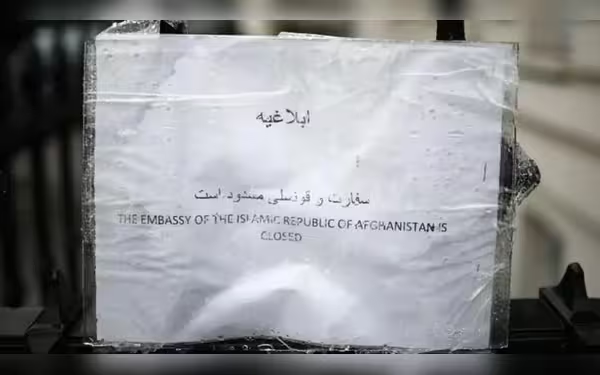Saturday, November 16, 2024 07:38 PM
Afghan Embassy Closure in London Following Taliban's Diplomatic Shift
- Afghan embassy in London closes on September 27, 2023.
- Closure follows official request from the UK government.
- Impacts Afghan citizens' access to consular services.
 Image Credits: thenews.com.pk
Image Credits: thenews.com.pkThe Afghan embassy in London closes due to Taliban's diplomatic shift, impacting Afghan citizens' access to vital services.
The recent closure of the Afghan embassy in London marks a significant shift in diplomatic relations following the Taliban's rise to power in Afghanistan. The Afghan ambassador to the UK, Zalmai Rassoul, made the announcement on social media, stating that the embassy would officially close on September 27, 2023. This decision comes at the "official request of the host country," indicating a complex and strained relationship between the Taliban-led government and the United Kingdom.
In his statement, Rassoul emphasized, "The State of Afghanistan decided to close the Afghan Embassy in London and dismiss its staff." This closure not only affects the diplomatic presence of Afghanistan in the UK but also raises questions about the future of Afghan citizens living abroad and their access to consular services. The embassy has been a vital link for Afghans seeking assistance, especially in light of the ongoing humanitarian crisis in Afghanistan.
The Taliban's government has faced international isolation since it took control of Afghanistan in August 2021. Many countries, including the UK, have been hesitant to recognize the Taliban as the legitimate government, leading to a series of diplomatic challenges. The closure of the embassy is a clear indication of the deteriorating relations and the complexities involved in international diplomacy.
As the situation unfolds, it is essential to consider the implications for Afghan citizens both at home and abroad. The lack of a functioning embassy means that many Afghans may struggle to obtain necessary documents, such as passports or visas, which can hinder their ability to travel or seek refuge in other countries. This situation highlights the urgent need for international dialogue and support for the Afghan people during these challenging times.
The closure of the Afghan embassy in London is not just a bureaucratic decision; it reflects the broader geopolitical tensions and the plight of the Afghan people. As the world watches, it is crucial to advocate for the rights and needs of those affected by these changes. The hope remains that diplomatic channels can be reopened in the future, allowing for better support and assistance for Afghans both at home and abroad.













